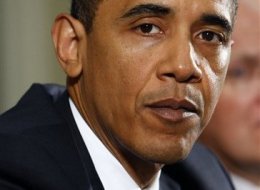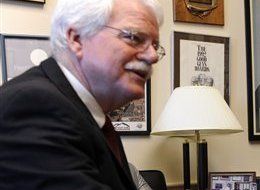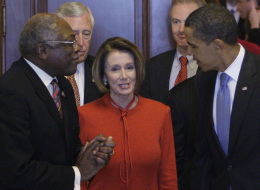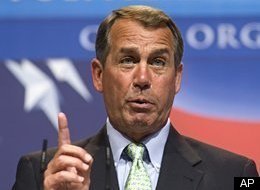Despite the
recent surge of support in the Senate for a government-run health insurance option, President Obama chose not to include one of the most popular elements of reform in the plan he is presenting to a bipartisan group of lawmakers Thursday.
The
Obama plan explicitly bridges the differences between Senate and House legislation on issues both large and small, but on the public option -- which is included in the House bill, but not in the Senate's -- Obama is entirely silent.
Last week, Health and Human Services Secretary Kathleen Sebelius told MSNBC's Rachel Maddow that Obama would "absolutely" fight for a public option if Senate leadership decided to go for it. "[I]f it's part of the decision of leadership to move forward, absolutely," Sebelius said. "The president said from the outset he thought that was a great way to provide cost reduction and competition moving forward, but if that is not the choice of the majority moving forward, I think there are other ways to get there."
Since then, Senate Majority Leader Harry Reid (D-Nev.) said he would work with his colleagues to find the votes needed for it; Sen. Charles Schumer (N.Y.), the third ranking Democrat, pushed for it to be included; and Sen. Bob Menendez (N.J.), chairman of the Democratic Senatorial Campaign Committee, joined in the call as well.
But neither that nor the public option's consistently strong appeal in public-opinion polls was enough to persuade Obama to get behind it.
Indeed, after months of watching Obama say generally that he supports the public option while doing little to see it implemented into law, backers of the idea were unsurprised it was left out of his final offer.
"We didn't expect one," said Darcy Burner, head of the Progressive Caucus Policy Foundation.
My first view of the summit was that it was a bad idea; one in which the risks were disproportionately being taken by President Obama. But the general gridlock in the Congress, and particularly the polls that came out at the end of last week have changed my thinking.
Just to be clear, a deep skepticism continues to be a strong minor chord in how I think about summit meetings in general, and this one in particular. Summits work best when the conclusions are reached before the summit begins, and the role of the attendees is to put an approval stamp on them. Summits are terrible vehicles for the discussion of major open issues; and it is hard for me even to imagine how a televised summit can possibly work.
But... this reasoning is only correct if you think that the situation and position of the Administration is just fine and will stay that way. More melodramatically, if you think the country is in fine shape. If, however, you believe the situation is precarious, that some kind of change of strategy is essential, and on the minor question of the substance, even a start at real health care reform is unlikely without a game-changer -- then the situation looks different. That's where I think we are. I found two recent columns quite convincing. Ruth Marcus,
writing in the Washington Post on Feb 10, argues that while the path to a summit may not have been particularly orderly, it may be that if the President is willing to "ladle some meat into the bowl" -- that is, by making a real move away from the current non-starting health care legislation on the Hill, he might actually move some Republican Senate votes. I think so also, and I think the recent polls suggest why.
In
Friday's New York Times, David Brooks argued that "the original Obama project, the third Democratic wave (of domestic transformation), is dead." He then goes on to say that the Obama project that can still be successful ought to be to show that the nation is governable once again, and that people can reach across the aisle and come to real agreements. I don't think that the substantive Obama agenda is "dead," but I do think it can only happen with major modifications. I also think it can only happen if the President does indeed show that our nation is governable again. The only way the President can begin to restore trust on the part of the American people in government is to show that the system can produce something.
Finally,
the newest polls say that while Obama remains somewhat below the 50% mark in terms of popularity, the Congress hits new lows by the day. Democrats are marginally more popular than Republicans but both sides in Congress are in trouble. Fewer than 10% of Americans believe that members of Congress deserve reelection. At the same time, President Obama is about 5 times more popular than the Congress. He is seen by Americans as less likely to favor special interests, and as someone who understands their needs and problems and has made more of an effort to be bipartisan. Congress really does have to show that it can do something, and its only available partner is President Obama, who is much more popular. This is particularly true for Republicans. Their barely disguised effort to take the president down by making sure nothing works may hurt Obama, but it will hurt the Republicans more.
This Summit could be productive. There remains a shot at real health care reform, and President Obama could come out of a productive summit in quite good shape. It all depends on what he has in mind, and how he plans to proceed. So lets look at that.
The White House has announced that it will put its own health care proposal on line a few days before the summit. I hope that proposal (1) steps away from the current bills in the House; (2) is clearly bipartisan in the sense of adopting some important proposals that some Republicans have put forward; (3) does not try a total all at one time transformation but rather proposes some actions for now and offers a roadmap for the future; and (4) shows a more balanced concern for costs of as well as increased access to health care. I think you can do all of this including adopting some key Republican proposals.
If I were writing the policy proposal, I would go in the following broad general directions.
(1) In terms of exchanges acting as a basic mechanism for long run cost control, we do not now have any general mechanism that permits and requires the cost conscious exercise of true choice by consumers. Most employees have their choices made by a human resource bureaucrat in their company. The remaining "market" is a small rump market which is balkanized between the states so there is no conceivable way it can function. Both the House and Senate bills put exchanges forward unenthusiastically; the bipartisan
Wyden-Bennett bill had exchanges as its centerpiece; and it is a market mechanism the Republicans should love. Lets strengthen the exchanges, take away the antitrust exemption of insurance companies, but at the same time allow them to compete nationally.
(2) We need a major commitment to access to health care for all kids under 18, including pre-natal care; coupled with a road map for the future. I've written on this topic within the last week and will not repeat myself, but this has to be a direction that would be attractive for both parties. But at the same time lets make a move toward broader access, and fairness -- even if we can't afford to do everything now. Let's agree with the Republicans on medical savings accounts and provide a tax sheltered way for the self-employed to pay for health care.
Some Republicans suggest providing federal money to states "to establish high-risk pools, for people with chronic illnesses who cannot find private insurance at an affordable price; I think the Summit should take this idea seriously.
(3)
Tort Reform - This is a central cause for Republicans, President Obama has spoken favorably about it; it should be a central part of the Administration's proposals.
(4) We need to adopt the "cadillac" tax. The complete tax sheltering of all employer provided health insurance is bad policy: it is unfair, and it makes cost conscious individual choice impossible. I would rather turn the current exemption into a credit available to everyone but the tax is what is possible today.
My point is simple. As soon as you step away from the debate we have been mired in for a year that focuses entirely on the current House and Senate bills -- as soon as you allow other ideas to enter in -- a large number of feasible directions emerge that Republicans will have to think long and hard about before they turn on and oppose. I like the picture of President Obama presiding over a summit in which he has put forward a truly bipartisan proposal. I think he comes out of such a summit either with a health care direction that can work; or with the Republicans pushed into a corner they will have trouble getting out of.
There is just one problem with all of this I do not understand. Simultaneously, on a completely different track, in a universe far away, the House and Senate leadership is preparing to go forward with the existing Senate health care bill and with reconciliation legislation that will be jammed through the Senate. There is probably a level of political tactics here so deep, so subtle, so devious that ordinary humans will never understand it. But this would seem to me to blow up any chance that the summit could be successful.
WASHINGTON — President Barack Obama said Saturday the health care meeting he's holding next week with Democratic and Republican lawmakers will test their ability to solve not just this problem, but other problems, too.
Republicans said lawmakers must scrap current proposals and start over, lest the meeting turn into a charade.
"After debating this issue exhaustively for a year, let's move forward together," Obama said in his weekly radio and Internet address. "Next week is our chance to finally reform our health insurance system so it works for families and small businesses. It's our chance to finally give Americans the peace of mind of knowing that they'll be able to have affordable coverage when they need it most."
A starting point for talks at Thursday's meeting at Blair House, across the street from the White House, is a yet-to-be-seen version of two health care bills passed separately by the Democratic-controlled House and Senate.
Speaking for Republicans in their weekly address, Michigan Rep. Dave Camp said people want Obama and the Democrats to "scrap their misguided plan of a government takeover of health care" and start over by taking a step-by-step approach.
"For those families and small businesses looking for a sign that Washington is ready to wake up and find common sense on this issue, next week's White House health care summit may not be it," said Camp, the top Republican on the Ways and Means Committee, one of several congressional panels that helped draft the House version of the overhaul bill.
He charged that the newest bill was being written in secret and said that "if the starting point for this summit is more of the same backroom deals and partisan bills, then this meeting will likely be a charade."
Obama said the session, to be televised by C-SPAN, will test whether the executive and legislative branches of government can work together. He said people are fed up with a partisan sourness that is causing gridlock.
"What's being tested here is not just our ability to solve this one problem, but our ability to solve any problem," Obama said.
The American people are smart enough to do this on their own. -- John Boehner, Ohio Republican Representative, when asked on Meet The Press if there should be federal government regulation over the purchase of health insurance across state lines.
Part of our 2010 Faux Revolution is the expulsion of ridiculously unsubstantiated nonsense like using the American People whenever someone is trying to make, prove or back up a point. There is no real American People, and if there were such an animal there is no way they would be willing or able to agree en masse on everything stated daily by debaters, lawmakers, executives, pundits, etc. It is a fantasy, which is a nice way of saying it is a blatant lie, and it must stop. In fact, all mention of any kind of "people" in solidarity must cease, especially when pitching ideology. The good of a group is never considered when ideologies are being thrown around. It is only good for the ideologues espousing their creed for an explicit segment of society. The rest is a steaming pile of bullshit.
There is one exception; as is the rule in every scientific postulation: The American People adore free stuff or want a lot of stuff, but not pay a lot for it. This, of course, is not particular to the American People, but Human Nature in general. "Free" is the most popular word in any language, but since we are built as a nation on the concept of Free, it comes with the territory. This is why populism is so popular among the American People. Give us more cops! More parks! More malls! More roads to get to the malls! Bring the mail! Protect the kids! Kill the bad guys abroad! Keep the banks honest! Taxes? Fuck that!
Then there is the Oedipal angle of the American People. Who did this terrible thing to us? Oh, it's us!
For instance, lately, the American People have come to their senses about institutions; suddenly they all suck. Government, Organized Religion, Banks, Military, almost all forms of systemic authority are under scrutiny. Ah, but who thought up these institutions? Who runs them? In most cases who chooses who runs them? And who supports their perpetuation? The American People do. Did I miss something? Are the Russians running our banking system? Who makes our laws and enacts them? Scandinavians or Americans? And are these people or pods of some kind?
Right now you're shouting, "Hey, I didn't vote for..." or " I did not choose...", but then aren't you also a member of the American People?
A-ha!
I love when American People in a position to opine while speechifying broach the distinction between the American People living on Main Street and the American People running Wall Street; as if only one such group is defined as the American People, which is apparently at odds with the thinking of the American People.
Another queer aspect of the American People quotient is its inability as a group to determine what is acceptable for the individual as opposed to the whole, and most importantly how individual conscience deals with society at large.
Two prime examples of this would be Abortion Rights and the Environment.
Several polls annually state a majority of the American People is against abortion as an act, the act of yanking a live healthy human fetus from an otherwise healthy female host. Yet, if faced with an individual case, say, your daughter is raped by a retarded, herpes-ravaged dope fiend at a Death Metal Concert, there is some leeway. Usually, in a bizarre twist many American People who do not want the government regulating their use of weaponry have no problem dictating the possession of actual living tissue inside fifty-one percent of the populace.
Oh, and although the American People are all for drilling for oil or wiping out forests to build Walmarts, it's not so cut and dry if it is taking place across the street. In both cases we have a "We're against it, but..." and a "We're all for it, but..." issues continuously presented as one solution to please the American People
Another excellent and more pressing illustration is the National Health Care issue. Like Social Security, Medicare, Education, and other mass government-run entitlements, there is at first an opposing yammer of "socialism" or "tyranny". Then, after it is instituted, whether it works or not, it's a Third Rail, an untouchable "right" of the American People. First the American People are against it, and then once they have it, the American People fight like rabid dogs to keep it. In most circles this would be called schizophrenic behavior, in more select ones, fucking hypocrisy.
Then there is the case of the American People not realizing who is among the counted, as in every possible Gay Rights issue known to us.
Right now there is a congressional hearing going on to determine if it is unlawful to deny members of the United States military, which is of course apprised of American People, their right to be openly gay.
This is spectacularly asinine in several fascinating ways, not the least of which being that whilst engaged in military service American People are no longer considered "civilian", and thus their normal everyday distinctions as woman or man, black or white, poor or privileged, etc, no longer apply. The idea of an army of one is an Army of One. This accounts for the similarity in haircuts and uniform, not to mention a singular code of decorum. The individual aspects of the American People are stripped from them, including determining the worth of a soldier by where he/she places his/her privates in any given act of coitus.
But that's nothing compared to the outrage of debating a government employee's individual rights while completely ignoring those of the American People who happen to also make up our homosexual citizenry. This is not only the proverbial "cart before the horse" as much as it is "the contents of the cart before the cart is even assembled". Never mind the goddamned horse.
So, okay, we're agreed? The American People do not want national health insurance just assuredly as the American People crave it. The American People include the entirety of the American People regardless of sexual or political preference. Therefore we conclude unequivocally to never dump the American People on the American People again.




